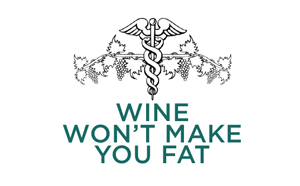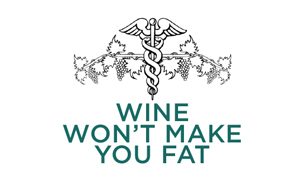WINE WON’T MAKE YOU FAT
A recently published scientific report on the influence of drinking upon weight stimulated a review of relevant medical literature and discussions by fellow members of the International Scientific Forum on Alcohol Research. I came away little the wiser.
It is generally believed, including among physicians, that consumption of alcohol leads to weight gain, even obesity. As a corollary, many physicians advise that dry wine is “full of carbohydrates,” and should be verboten for diabetics. Both beliefs are untrue. What is true is that we do not yet clearly understand the relationship between alcohol and weight. What is also true is that moderate drinking won’t make you fat, nor will it aggravate diabetes.
The large study referred to above, Downer MK. Obesity 2017 (1 November);25:1988-1996, performed by an experienced and reliable group from the Harvard School of Public Health, the Brigham and Women’s Hospital, and the Beth Israel Deaconess Medical Center, all in Boston, found, in essence, a negligible effect of drinking upon weight, contributing to, perhaps, a gain in weight of less than four ounces per year. Wine and light beer, in particular, were not found associated with any weight gain. But that’s not the end of it. Investigators have long known that alcohol may not be handled by the body’s chemistry in the same way as other carbon-containing compounds, like carbohydrates (sugars and starches) and fats; that drinking may alter how foods are metabolized; and that there are odd differences between individuals, between men and women, and among different alcoholic beverages. These differences hint at betrayal of standard metabolic models. Heretic hints whisper that sometimes a calorie is not a calorie. Studies thus far have not explained any of this. In the case of wine, it is not clear whether it is the alcohol or other compounds that are operative. I am sparing you and myself the intricate biochemistry.
Among the factors that influence the body’s calorie supply and demand, vis-à-vis alcohol, are genetic makeup, body habitus, eating habits, drinking patterns, sex, and choice of beverage. Drinking smaller amounts more frequently results in less impact on weight than drinking in bigger gulps less often, even for the same total quantity.
Diabetes specialists and the American Diabetes Association agree that diabetics need not eschew moderate intake of alcohol. Moderate drinking has been shown to improve insulin sensitivity, reduce the risk and severity of the disease, and to decrease the risk of its frequent and life-threatening cardiovascular complications. The diabetic drinker should account for the calories (7 per gram) derived from alcohol consumed as if it were another food, and must eat while drinking, else risk hypoglycemia. As for wine’s contents, each ounce of dry wine contains about a meager 24 calories and half a gram of carbohydrate. Most of the calories are derived from the alcohol, the grape sugar having been consumed during fermentation and converted to alcohol. Even sweet and fortified wines contain relatively little more.
Of course, it is what the drinker eats that will mainly determine changes in weight.


